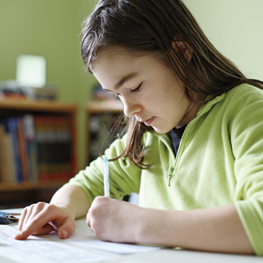
It is Spring and your child (or youth) has tests (e.g. Provincial Achievement Tests, year-end tests) in June that they will need to study for. Ideally, your child has consistently learned new academic skills throughout the year by balancing homework with social activities, exercise and plenty of sleep.
If this is the case, then studying for tests can focus on reviewing and refreshing known information. If this is not the case, then the task of preparing for tests is much more complex. Either way, my advice to parents is to help their child prepare for tests in three ways: a Proactive Structure, Basic Foundations and a Study Plan.
Proactive – homework structure: Parents need to partner with their children to develop an effective homework structure that is maintained throughout the year. Establish a set time each day for doing homework. Don’t let homework be left until just before bedtime. Teach your child to use a timer – if your child works hard for a set amount of time (15 minutes), then they earn a 5-minute break. Identify a quiet, well-lit place to do homework – eliminate any possible distractions (TV, social media). Homework structures need to remain in place through elementary, junior and most of high school, adjusted to the degree of independence which your child can handle.
Foundation – nutrition, sleep, social activities, exercise: Good nutrition and sleep fuels a body and a mind. Teach your child how to use the Canadian Food Guide to plan balanced meals and snacks. Ensure that your child has easy access to these types of nutritious snacks when studying. Sleep is essential for a brain to work efficiently – cramming for a test the night before is not effective. Do not stray from sleep routines – the Canadian Sleep Society’s website offers some sleep hygiene tips and guidelines, www.canadiansleepsociety.ca.
During the weeks leading up to major tests, your child may need to cut back on social activities, sports or work commitments but it is important that there are planned breaks – a soccer game or a movie is a good way to reward effort and take a mental vacation.
Study plan: Developing a study plan starts with helping your child create a workable schedule during the weeks before tests are scheduled. First ask your child’s teachers how much studying is recommended and the dates of tests. Then, sit down with your child with a calendar to make a plan based on studying priorities (based on test dates and the amount of information that needs to be covered). Research has demonstrated that students will learn more if they study for shorter amounts of time over several days as opposed to one day for a longer period of time (20 minutes x 5 days > 120 minutes x 1 day).
At this point, parents can help their child select beneficial studying strategies. For some children, condensing class notes onto recipe cards or into a graphic organizer is effective. Other students benefit from working with a study partner – paraphrasing material and asking each other questions. Very few students benefit from just rereading material. I find variety works best – use auditory and visual strategies – have your child make quiz cards that can be used during study sessions with a peer or a parent. On test day, make sure your child gets to school early so they can be organized and ready for the test. Provide encouragement and remind them that if they feel panicked to take a deep breath and just get started. It is important that parents teach their children that their test marks are not given, marks are earned as a result of hard work.
More help from the library or bookstore
Study Smarter, Not Harder by Kevin Paul
How to Study, 6th Edition by Ron Fry
Middle School Study Skills by John Ernst
101 Ways to Make Studying Easier and Faster for High School Students by Janet Engle
Dr. R. Coranne Johnson, R. Psych., has been working in the education field for 24 years as a teacher, administrator and school psychologist. She has also taught university courses in the areas of special education, psychology and program effectiveness. Through Dr. Johnson’s work in schools, she has developed a wealth of knowledge about learning, literacy and special education. Dr. Johnson can be contacted through her website, www.helpingchildren.ca.
Calgary’s Child Magazine © 2024 Calgary’s Child